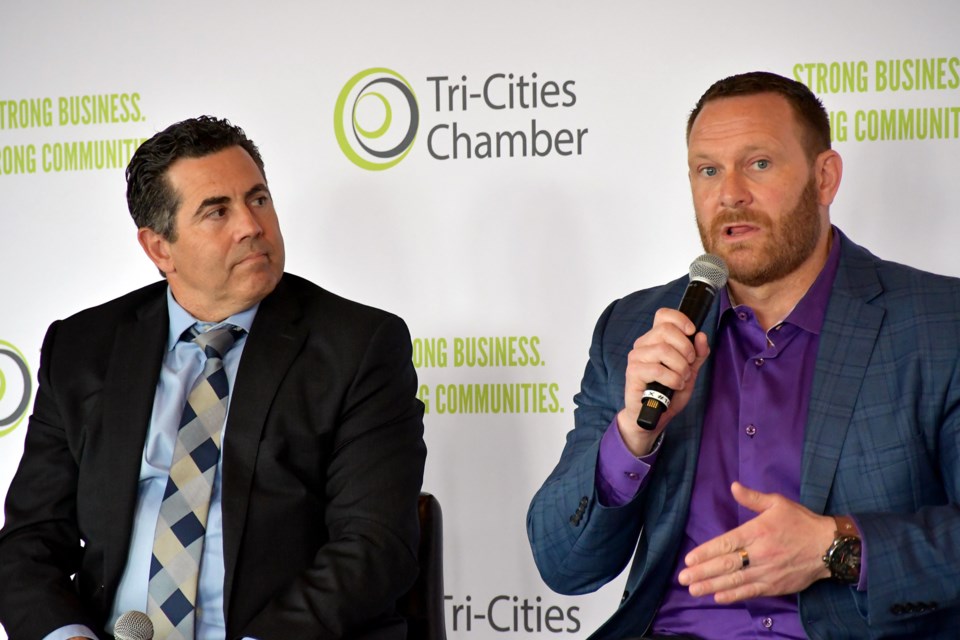Coquitlam’s city manager spoke bluntly this morning, May 14, before dozens of Tri-City business and political leaders about the “disrespect” that Ottawa and Victoria are currently showing to municipal governments in B.C.
Raul Allueva, a former general manager in Coquitlam’s planning and parks departments, was part of a panel at the Tri-Cities Chamber of Commerce’s eighth annual Economic Summit that focused on the future of Metro Vancouver and the sub-region that includes Coquitlam, Port Coquitlam, Port Moody, Anmore and Belcarra.
Allueva zeroed in on the recent provincial upheaval to municipal housing policies aimed at easing the housing crisis — “clumsy” legislation that he said was done without civic consultation and has put significant pressure on city hall staff to quickly change land use locally to get more homes up and grow faster.
The provincial mandates, he warned, will set municipalities back at least a year as they grapple with the legislation with not enough staff available.
And the lack of personnel and certainty as the “one-size-fits-all” housing changes are made around the province “will be the death of business," he claimed.
Allueva, along with panelists Jacquie Griffiths, president of Invest Vancouver, and Trevor Koot, CEO of the BC Real Estate Association, said the “misalignment” between the three levels of government — especially on the housing front — is having an impact on B.C.’s business sector as people leave for higher-paying jobs in Alberta, where the land and homes are cheaper.
The loss of talent, combined with the limited affordable housing stock in Metro Vancouver, is creating concerns globally, Griffiths said, as the area “is known as a very expensive place to live … but our reality is our reality and we need to find the right mix for a stronger economy. If we don’t work together, we will be left behind.”
Koot said successes like Expo 86 and the 2010 Winter Olympics, plus the upcoming FIFA World Cup games in 2026, have helped Vancouver’s brand.
But because of the government intervention, talent pull and current delays with land use, Metro Vancouver’s reputation is taking a hit.
Koot mocked comments from Steven Guilbeault, Canada’s minister of environment and climate change, who spoke earlier at the Summit, about finding partnerships for business to thrive.
“To me, it’s not happening,” he said while also citing the government misalignment.
Still, Griffiths said there are many ways Metro Vancouver can lean in where other jurisdictions are not — specifically in research and development.
For suburbs like the Tri-Cities, she said, there are opportunities in the hospitality sector, for example, where Vancouver hotels can’t handle the tourism load.
Vancouver is now drawing proposals for events with 100,000 to 200,000 people and organizers are finding “there’s so much more that the region has to offer,” she said.
As well, the panel touched on livability aspects that other Canadian cities can’t provide that can attract more jobs — namely, the Tri-Cities' natural environment and its tourism draws with major events, festivals and sporting tournaments.
“We have an incredible lifestyle here,” Allueva said. “It’s going to drive quality businesses and investments.”
Sponsored in part by the Tri-City News, the Chamber’s Economic Summit 2024 was held at the Westwood Plateau Golf and Country Club.
Other attendees included Coquitlam–Port Coquitlam MP Ron McKinnon and Tri-City mayors Richard Stewart and John McEwen, as well as Eric Kalnins, Coquitlam’s economic development manager.





